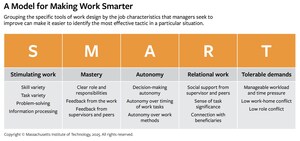6 Key Recommendations for Managers
CAMBRIDGE, Mass., July 20, 2023 /PRNewswire/ -- According to new research released today in MIT Sloan Management Review, fewer than one-third of U.S. employees surveyed reported that their organizations engaged in practices that embed sustainability goals in business models and employee roles.
To shed light on the state of play in embedding sustainability and to identify key bottlenecks, CB Bhattacharya of the Center for Sustainable Business at the University of Pittsburgh and Rob Jekielek of The Harris Poll collaborated on a survey of U.S. employees to find out whether their companies were taking measures to prompt employees to conduct business through the sustainability lens.
Results are identified in "Sustainability Progress Is Stalled at Most Firms."
Bhattacharya asserts that "While many companies talk the talk of sustainability, claiming to be integrating environmental and societal concerns into their business models, far fewer walk the walk: Sustainability is typically treated by most managers as someone else's problem and relegated to a department or even a single individual."
Companies that are successful in transforming their business models have endowed their employees with a sense of sustainable ownership, spurring them to engage in more sustainability-related behaviors. Yet, only 30% of employees surveyed strongly agreed with the statement "I understand how I can improve my company's sustainability performance through my role," with slightly fewer agreeing that "My company gives me a chance to use my personal initiative or judgment in carrying out sustainability initiatives."
When every employee integrates environmental and social concerns into every business decision, sustainability progress is accelerated. "Sustainability Progress Is Stalled at Most Firms," identifies six key recommendations for managers to embed sustainability into organizational models and cultures:
- Establish a purpose based on values.
- Bake sustainability into corporate strategy.
- Train employees and incentivize actions that advance sustainability.
- Create a sustainability culture in your organization.
- Conduct business through the sustainability lens.
- Bridge the last mile.
"Small actions make a big difference," continues Bhattacharya. "If all employees do what they can in their own spheres of influence, impact will take place."
The Research
The survey drew responses from 1,056 employees, representative of the U.S. employee base. Sustainability was defined for the respondents as integrating environmental and societal concerns into business decisions and actions. Respondents were asked to rate their level of agreement on a 4-point Likert scale (strongly agree to strongly disagree) with a series of 19 statements about the status quo, such as "My company has a clear business case for improving our sustainability performance." A series of 12 issues were presented that posed potential challenges to sustainability progress, such as "Sustainability is not built into our business strategy," and asked respondents to rate the extent to which that is an actual challenge at their company (major challenge to not at all a challenge).
The MIT Sloan Management Review article "Sustainability Progress Is Stalled at Most Firms" publishes at 8 a.m. ET on July 20.
About the Authors
CB Bhattacharya is the director of the Center for Sustainable Business and the H.J. Zoffer Chair in Sustainability and Ethics at the Katz Graduate School of Business, University of Pittsburgh. He is the author of Small Actions, Big Difference: Leveraging Corporate Sustainability to Drive Business and Societal Value (Routledge). Rob Jekielek is the managing director of The Harris Poll.
About MIT Sloan Management Review
MIT Sloan Management Review is an independent, research-based magazine and digital platform for business leaders, published at the MIT Sloan School of Management. MIT SMR explores how leadership and management are transforming in a disruptive world. We help thoughtful leaders capture the exciting opportunities — and face down the challenges — created as technological, societal, and environmental forces reshape how organizations operate, compete, and create value.
Connect with MIT Sloan Management Review, on:
CONTACT: Tess Woods
[email protected]
617-942-0336
SOURCE MIT Sloan Management Review

WANT YOUR COMPANY'S NEWS FEATURED ON PRNEWSWIRE.COM?
Newsrooms &
Influencers
Digital Media
Outlets
Journalists
Opted In




Share this article